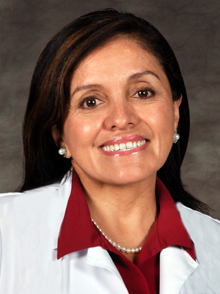Gladys Velarde, MD, explains how risk factors affect women differently than men
It sounds like a stereotype when someone says women’s hearts are more sensitive than men’s, but science is proving it’s true.
“Our biology and gender have strong interactions. Studies are now showing the female heart is more sensitive to emotional and physical stress,” said Gladys Velarde, MD, medical director of UF Health Jacksonville’s Cardiovascular Women’s Heart Program, during a Women’s Heart Health luncheon at the hospital.
That sensitivity translates into risk for cardiovascular disease because those tough times take a toll on the heart. The female heart is also more sensitive to risk factors like drug use, high blood pressure, diabetes and cigarette smoking.
Researchers like Velarde are beginning to probe into the biological difference between male and female hearts to better understand how to treat the female heart. In the past, studies assumed the heart behaved the same way for both sexes and that symptoms were the same. Now, researchers realize that isn’t true.
Already, they have learned:
- Females have smaller hearts
- The nervous system’s influence on the heart is different
- Plaque forms in the arteries differently
- The pain receptors that warn a woman she is having heart trouble are different.
As research continues, more differences are likely to emerge.
The classic picture for a heart attack victim is a man under stress, perhaps overweight, Velarde said. Although women are perceived as less likely to have heart disease in our society, the opposite is true.
“Heart disease has been the number one killer of women since 1984. Only 50 percent of all women are aware of that, and a smaller percentage of minority women are aware that heart disease is their number one enemy,” Velarde said.
She said more than 50 percent of American women who died in 2010 – 410,000 women – died from complications related to ischemic heart disease, which relates specifically to blockages of the heart arteries. And cardiovascular risk isn’t just an older woman’s problem. Velarde said over 30,000 women under age 55 are hospitalized every year after having heart attacks.
While some heart trouble comes with genetics and age, which can’t be controlled, many influences on the heart come from the way a woman lives her life, Velarde explained.
She recommended every woman take a careful look at her lifestyle, including exercise, diet, stress and supplements.
Velarde referred to foods high in trans fats and depleted of nutrients as “weapons of mass obesity.” But she said women should use careful consideration even with food and supplements that appear to be healthy.
There are more than 54,000 dietary supplements on the market today, but none are regulated by the FDA, she said.
“Be very, very cognizant of that. Make sure you know what you are taking and what is on the bottle label,” she said.
To manage stress, she recommended making it a mission to stay positive, be productive in life and find a purpose. Sleep, spirituality and healthy choices also will help keep stress at bay.
“Make it a lifestyle, not a duty,” Velarde said.
Velarde is the co-author and editor of “Management of Cardiovascular Disease in Women” – a guide and resource for physicians treating women with heart disease. It is the first published book that’s solely devoted to treating heart disease in women on a broad level. She is the director of the Women’s Heart Program at UF Health Jacksonville.
Featured Faculty
2078

Gladys P. Velarde, MD, FACC, FAHA
Professor
Medical Director, Women's Cardiovascular Heart Program